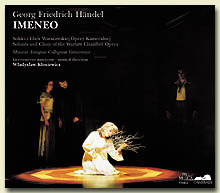Imeneo was Handel’s penultimate opera, premiering in London in 1740,
and revived in Dublin in 1742. The latter was in the same season as Messiah,
and it is hardly surprising that it was somewhat overshadowed at the time, but
it has also been neglected since. It now seems to be heading along the same
trajectory of resurrection as Handel’s last opera Deidamia, with a
critically well-received performance at the 2003 Halle festival. There have
been few recordings. A version auf Deutsch from Halle 1960 was issued on CD in
1996 (Berlin Classics, under Margraf); truncated, transposed and turned all
about it is hardly acceptable to modern listeners (although it is rather a
jolly sing). A more complete version was brought out in 1986 by Vox, conducted
by Rudolph Palmer, but it is rather a dreary affair, apart from the singing of
Julianne Baird. A new version is therefore welcome, and this Polish live
recording is worth the not inconsiderable effort needed to obtain it from the
Warsaw Chamber Opera‘s
web site.
As usual with Handel’s operas, there are various permutations from which
modern performers can choose (see Donald Burrows’ HHA edition). There are two
draft versions preceding the two performance versions (London 1740, Dublin
1742). The main differences concern the name role of Imeneo who began as a
tenor, became a bass for the premiere and reverted to tenor in Dublin. Tirinto
was sung by a castrato (Andreone) in London, and in Dublin by the notorious
Mrs Cibber, whose performance in Messiah is supposed to have led to her
vocal exoneration of past sins by a clergical member of the audience. For the
Dublin performance, some additional material was included, notably an aria
from Deidamia (‘D’amor nei primi istanti’, for Imeneo) and a duet from
Sosarme (‘Per le porte del tormento’, for Tirinto and Rosmene). Some
arias were reassigned, one from Argenio to Imeneo (‘Di ceica notte allor‘),
one from Tirinto to Imeneo (‘Sorge nell’alma mia‘) and one from Imeneo to
Tirinto (‘Chi scherza colle rose‘). There are strong hints of Messiah
in a couple of the original 1740 arias.
There are some odd aspects of Imeneo (called in Dublin Hymen, a
Serenata, but still sung in Italian). Some of them foreshadow the last
opera, Deidamia, with more than the usual number of choruses (which
also of course anticipates the dominance of oratorio in Handel’s subsequent
composing life), and with a rather downbeat ending, reflected in a final muted
coro. What is unusual is the question of who is the hero here. Tirinto,
singing in the alto range whether castrato or contralto, would normally be the
one who gets the girl, but here he misses out; and he’s rather wimpy, wanting
to save Rosmene but clearly having no idea how to do so, so he just laments
away, albeit beautifully. Imeneo is of course the name role, but he’s a bass,
then a tenor, so he really should be the uomo secundo by baroque standards;
and he’s not really that likeable. He just wants the girl (Rosmene) whatever
anyone else feels about it, and since he’s rescued her, clearly thinks he
should have her. Argenio, as the heroine’s father, is a rather typical
paternal type who thinks the girl should just do what she’s told. And in the
end she does, so probably everyone ends up miserable. At least in Deidamia
the donna secunda gets a happy ending. In Imeneo, Closmene is in love
with Imeneo, so absolutely no-one wins.
The importation of the duet ‘Per le porte’ in 1742 means that the last
number for soloists before the final coro is sung by the two lovers who
are not to be together. In Deidamia also the final duet is sung by the
name heroine Deidamia and Ulisse, who is her antagonist and not her lover, but
at least she and Achille, who IS her lover, are united, although the audience
of course knows that Achille will die. In Imeneo however the lovers are
united in song expressing their love in the face of an inevitable and
permanent separation. This is a very unusual situation in Handelian opera,
dramatically and even psychologically anticipating a much later Romantic
sensibility. It might not of course be just for that reason that it is now
always included as it is a singularly exquisite piece of music.
Klowiewicz has opted to cast a countertenor as Tirinto and a bass as Imeneo,
but to include the extra pieces from the Dublin performance. He has however
chosen to discard Tirinto’s aria ‘Mi chiederesti meno‘. Tirinto also loses his
1740 aria ‘Sorge nell’alma mia’, which is sung by Imeneo as in 1742. Argenio
retains ‘Di cieca notte allor’ as in 1740, and also has been given ‘Chi
scherza colle rose‘, which was sung by Imeneo in 1740 and Tirinto in 1742.
These choices are not incompatible with the drama, and may be explained to
some extent by the casting. What is most curious is that the aria originally
sung by Nerea in Deidamia, ‘D’amor nei primi istanti’, and recycled for
Imeneo to sing quite appropriately in Act I in Dublin, now turns up in Act
III, and sung by Argenio. There seems to be little dramatic justification for
this, although there is a precedent, as it is sung in Act III of the Palmer
recording, albeit by Imeneo.
Otherwise, musically and dramatically, this is a fine recording. The tempi
are much livelier than in the Palmer recording, and the orchestral playing far
more sensitive. Mostly the singing is excellent. Jacek Laszczkowski has an
outstandingly beautiful alto instrument, edging into soprano territory. (He
apparently also sings as a tenor). He has no sign of hootiness or breathiness,
and delivers some stunning high notes with no hint of strain. There is a just
perceptible catch occasionally in the passaggio. The duet with Olga
Pasiecznik as Rosmene is truly heart-rending, with both singers and strings
conveying real feeling as well as beauty. Pasiecznik is a good match for her
non-hero, with her warm even tone combined with accuracy and flexibility. Only
in the mad scene is she perhaps less demented than one would wish. Wojciech
Gierlach has rather a rough voice, which is probably suitable for a gruff man
of action, and he has a good attack on the colaratura. Andrzej Klimczak is
somewhat more baritonal, with a much smoother, lighter voice, which is perhaps
why he’s managed to pinch so many arias; his singing is very pleasant but a
bit lacking in dramatic commitment. He certainly doesn’t sound like he could
give two hoots what happens to Rosmene. In the heroine’s best friend role of
Clomiri, Marta Boberska has a rather more metallic sound than Pasiecznik, and
is a little less accurate of pitch, but delivers a lovely ‘Č si vaga’. The
chorus is excellent.
There is always for some a drawback with live recordings which may have
some superfluous noise, as this one does here and there. This can be, and is
here, compensated for by a good sense of narrative drama. It is to be hoped
that future recordings of this far from negligible, and very interesting,
opera will become available, but until they do, this is a very fine one to be
going on with.


